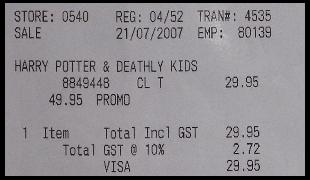Yes, I’m going to give some thoughts on the final Harry Potter book. It’s sort of film related; this is obviously going to be one of the major film releases of 2009 or 2010. But I’ll be the first to admit that’s just an excuse to jump on board the subject of the week.
(Major spoilers for the final Harry Potter book follow).
Most of the way through Harry Potter and the Deathly Hallows I was thinking the suits at Warner Bros must be cursing: the first three quarters of the book isn’t terribly suited to film, despite the frequent magical / action interludes. The fact that the book eschews the Hogwarts locale for most of its length robs the film of the setting that has united the series thus far, and the long months of travelling that the kids do is going to mean a lot of passage-of-time montages that are going to be tough to keep interesting.
But then when I got to the final battle, I could practically see the trailer unfolding in my head. Rowling has delivered a marketer’s dream: imagine now the scenes of good and bad wizards lining up for battle, big rallying speeches about the fight for Hogwarts, and Return of the King-style mass magical battles. If the trailer for the movie does not feature Professor McGonagall’s line near the climax – “Hogwarts is threatened! Man the boundaries, protect us, do your duty to the school” – or some sort of variation on it, then I’ll eat my Sorting Hat.
As to the book – well, I enjoyed it. The first four books still have a certain something the last three lacked, but it certainly builds to a rousing conclusion. A fair few of my predictions – about R.A.B.’s identity, Snape’s true allegiance, and about one of the Weasley twins biting the dust – came true, but an equal number didn’t. (I thought Hagrid was almost certain to die, for example). Rowling has said that she spared one character she originally planned to kill, and killed one she originally planned to spare: I suspect that means she swapped Fred for either Hagrid or Neville, both of whom I considered in mortal peril before the book’s release.
A minor disappointment: the resolution of the Snape storyline. Snape’s death was far too abrupt, and Rowling didn’t give us the confrontation between Harry and Snape that the series needed. Imagine if Harry had confronted Snape in the presence of another Death Eater: Harry would be accusing Snape of treachery; Snape would want to clear his name, but be unable to without blowing his cover. That would be much more dramatic than what we actually got. It would be nice to think that the director of the film will take the liberty of making such a change.
What I really didn’t like was the final chapter (the flash-forward), and hopefully they’ll ditch it for the film. Who wants to see adult Harry and Ginny, or Hermione and Ron? It takes the charm out of a happily-ever-after ending, and the stuff about their kid’s names is too cute and obvious. Frankly, what makes the teen-romance stuff in the series bearable is the kind of sweet nostalgia value to it: it would be much more satisfying seeing Harry and Ginny (and Ron and Hermione) together as the teens we’ve spent time with than flashing years forward to see them as adults. Similarly, I’d much rather the conclusion of the book show me Draco’s immediate reaction to Harry’s act of mercy than the lingering awkwardness 19 years down the track. This problem will only double on film (because the flash-forward would require a new cast or some kind of awful make-up job), so I hope we just go out on our heroes as teens.
Incidentally, the title of this post is inspired my docket from when I bought the book; I almost prefer the bookstore’s title:
It has a kind of Scooby Doo-ish quality that works well, I think. Which makes me sorry Rowling didn’t go with my preferred line for Voldemort’s dying words:
“I would have got away with it too, if it weren’t for those meddling kids!”
